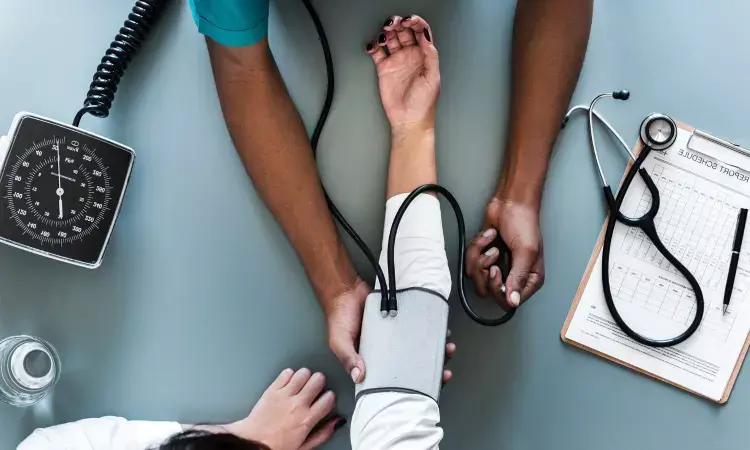- Home
- Medical news & Guidelines
- Anesthesiology
- Cardiology and CTVS
- Critical Care
- Dentistry
- Dermatology
- Diabetes and Endocrinology
- ENT
- Gastroenterology
- Medicine
- Nephrology
- Neurology
- Obstretics-Gynaecology
- Oncology
- Ophthalmology
- Orthopaedics
- Pediatrics-Neonatology
- Psychiatry
- Pulmonology
- Radiology
- Surgery
- Urology
- Laboratory Medicine
- Diet
- Nursing
- Paramedical
- Physiotherapy
- Health news
- Fact Check
- Bone Health Fact Check
- Brain Health Fact Check
- Cancer Related Fact Check
- Child Care Fact Check
- Dental and oral health fact check
- Diabetes and metabolic health fact check
- Diet and Nutrition Fact Check
- Eye and ENT Care Fact Check
- Fitness fact check
- Gut health fact check
- Heart health fact check
- Kidney health fact check
- Medical education fact check
- Men's health fact check
- Respiratory fact check
- Skin and hair care fact check
- Vaccine and Immunization fact check
- Women's health fact check
- AYUSH
- State News
- Andaman and Nicobar Islands
- Andhra Pradesh
- Arunachal Pradesh
- Assam
- Bihar
- Chandigarh
- Chattisgarh
- Dadra and Nagar Haveli
- Daman and Diu
- Delhi
- Goa
- Gujarat
- Haryana
- Himachal Pradesh
- Jammu & Kashmir
- Jharkhand
- Karnataka
- Kerala
- Ladakh
- Lakshadweep
- Madhya Pradesh
- Maharashtra
- Manipur
- Meghalaya
- Mizoram
- Nagaland
- Odisha
- Puducherry
- Punjab
- Rajasthan
- Sikkim
- Tamil Nadu
- Telangana
- Tripura
- Uttar Pradesh
- Uttrakhand
- West Bengal
- Medical Education
- Industry
HEPA Filters Lower Blood Pressure in High-Pollution Areas: Study

Researchers have found in a new randomized trial that using high-efficiency particulate arrestance (HEPA) filters in homes significantly reduced elevated blood pressure in individuals exposed to air pollution near major highways. However, no benefit was observed in people with normal systolic blood pressure (≤120 mm Hg). Researchers recommend targeting HEPA filtration for vulnerable populations residing in high-pollution zones. The study was published in the Journal of the American College of Cardiology by Doug B. and colleagues.
Particulate matter, and particularly PM2.5 (less than 2.5 micrometers in diameter), has been linked for decades with elevated cardiovascular risk, including hypertension. Since persons who reside near busy roads are exposed continuously to elevated levels of PM, enhancing indoor air quality may offer a focused strategy for the reduction of such risks. This pragmatic randomized crossover trial sought to determine whether HEPA filtration might be capable of providing quantitative improvements in blood pressure in such individuals.
The trial included 154 adults who lived next to highways. The participants' average age was 41.1 years, 59.7% were female, and 68.2% were non-Hispanic White. Participants were predominantly from higher socioeconomic strata. The mean baseline brachial blood pressure was 118.8/76.5 mm Hg.
Each residence was randomized to start with either a 1-month interval of HEPA filtration or a 1-month sham (placebo) filtration. This was followed by 1 month of washout and then 1 month of the alternate filtration. Blood pressure was measured at the start and end of each phase of filtration. PM concentrations were also tracked within a subset of homes. Linear mixed models were applied to evaluate changes in BP, controlling for different individual and temporal factors.
Key Findings
154 participants enrolled; mean age 41.1 years.
59.7% female; 68.2% non-Hispanic White.
Baseline BP: 118.8/76.5 mm Hg.
2.8 mm Hg reduction in SBP following HEPA filtration among individuals with SBP ≥120 mm Hg (P = 0.03).
0.2 mm Hg increase in SBP following sham filtration (P = 0.85).
Net 3.0 mm Hg benefit of HEPA filtration compared to sham (P = 0.04).
No effect on diastolic BP or normotensive individuals.
Substantial PM reduction validated in HEPA-filtered residences.
The randomized crossover trial finds that HEPA air cleaners can produce clinically relevant reductions in systolic blood pressure in adults with high baseline levels, even where ambient air pollution is relatively low. The results validate the application of indoor air filtration as an effective and non-pharmaceutical intervention to address hypertension and cardiovascular outcomes, particularly among residents of large-traffic zones.
Reference:
Brugge, D., Eliasziw, M., Thanikachalam, M., Kuchhal, V., Morson, C., Vazquez-Dodero, T., Mertl, A., Tallam, P., Kunwar, S., Sprague Martinez, L., Rashid, H. S., Singh-Smith, K., Gates, H., Palma, S., Goldstein-Gelb, W., Ginzburg, S. L., Hersey, S. O., Majluf, F., & Zamore, W. (2025). Effect of HEPA filtration air purifiers on blood pressure: A pragmatic randomized crossover trial. Journal of the American College of Cardiology. https://doi.org/10.1016/j.jacc.2025.06.037
Dr Riya Dave has completed dentistry from Gujarat University in 2022. She is a dentist and accomplished medical and scientific writer known for her commitment to bridging the gap between clinical expertise and accessible healthcare information. She has been actively involved in writing blogs related to health and wellness.
Dr Kamal Kant Kohli-MBBS, DTCD- a chest specialist with more than 30 years of practice and a flair for writing clinical articles, Dr Kamal Kant Kohli joined Medical Dialogues as a Chief Editor of Medical News. Besides writing articles, as an editor, he proofreads and verifies all the medical content published on Medical Dialogues including those coming from journals, studies,medical conferences,guidelines etc. Email: drkohli@medicaldialogues.in. Contact no. 011-43720751


